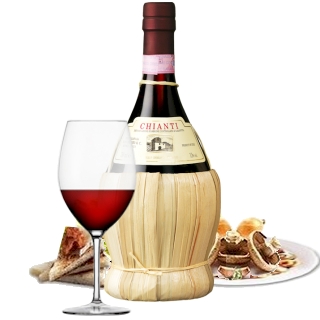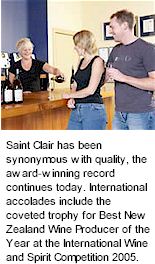


Saint Clair Family Estate is owned by Neal and Judy Ibbotson, viticulture pioneers in Marlborough since 1978. Grapes were originally supplied to local wine companies; however a desire to extend the quality achieved in the vineyard through to the finished wine led to the establishment of Saint Clair Estate Wines. Saint Clair’s viticulture philosophy for quality grapes is simple. Optimum flavour is achieved by significantly reducing vine stress; obtaining uniformity in vine growth, crop level and ripening; good light exposure, no disease, harvesting at the right time for maximising flavours and adjusting management for seasonal variations.

From 1994 when wines from the first vintage all won medals including gold, the name Saint Clair has been synonymous with quality and its award-winning record continues today. International accolades include the coveted trophy for Best New Zealand Wine Producer of the Year at the International Wine and Spirit Competition 2005. Saint Clair Family Estate also has the distinction of being the first New Zealand wine company to win major international trophies for Sauvignon Blanc and Pinot Noir in the same year.
Saint Clair Family Estate's success is founded on the 27 years of extensive pioneering viticulture, ongoing as a critical part of the highest quality winemaking practices. Neal and Judy’s passion for their Marlborough vineyards and award-winning range of wines is continuing to build their growing reputation in New Zealand and in the 35 markets around the world that they export to. The company's mission is to create world-class wines that exceed their customers every expectation. To achieve this, Neal Ibbotson’s viticulture expertise and Marlborough’s unique climate and soils, are both combined with the proven experience of one of New Zealand’s leading winemaking teams, led by Saint Clair’s chief winemaker, Matt Thomson.
Today the company is something of a family business with the next generation also involved. Son Tony looks after the graphic design and daughters Sarina and Julie both promote Saint Clair Family Estate in sales and marketing. Saint Clair Family Estate produce a wide range of varieties, including Sauvignon Blanc, Pinot Gris, Chardonnay, Riesling, Gewürztraminer, Pinot Noir and Merlot, available in four ranges of wines – the Reserve Range, Pioneer Block, the Premium Range and Vicar’s Choice.

Saint Clair has vineyards in five different Marlborough locations including the Rapaura, Awatere and Omaka Valleys. These vineyards have all been purchased and developed for the quality of the site. This enables fruit from the best site to be selected because only the best quality grapes and wine are retained by Saint Clair. In 2001 Saint Clair introduced a ‘grading system’ for all its vineyards and wine batches and marks them out of 10 for quality each year. This is providing valuable information. Records now show which vineyards and parts of the vineyards provide the best fruit and which varieties are growing the best quality in each of the vineyards. The grading system is also used extensively as a management tool for identifying and improving best vineyard practices, and for payments to growers.
The quality and sustainability of the Saint Clair vineyards is assisted by vertical shoot positioning in seasons of average or above warmth, (the Scott Henry split canopy positioning is used in cool years) leaf plucking, fruit and shoot thinning and selection, with no cultivation and minimal use of sprays. No insecticides are used at Saint Clair vineyards. At Doctor’s Creek Vineyard, Neal and Judy’s key varieties are Sauvignon Blanc Riesling and Pinot Noir. They have successfully experimented with top grafting Pinot Noir (using Dijon clones) in adjoining properties, where more clay under the sub-soil is providing some intense and interesting flavours.
The Awatere Valley, with its silt loam over deep sandstone, provides more mineral flavours in the wines. Here Sauvignon Blanc and Chardonnay predominate, although some of their Sauvignon Blanc has been re-planted with Pinot Gris, to learn more about the variety in this vineyard. Rapaura’s free draining alluvial soils, with a narrow band of top soil above stones, have been mulched in parts and irrigated according to soil type, to create an evenness across the vineyard to provide consistency of flavours. Merlot has proved to be very successful at this site, producing a number of trophies and Gold Medals. Saint Clair’s Omaka Vineyard, where the climate is slightly warmer by day, but cooler by night, and where the soil is more compacted and contains more clay, has proved very successful for Mendoza Chardonnay and more recently Pinot Noir.
